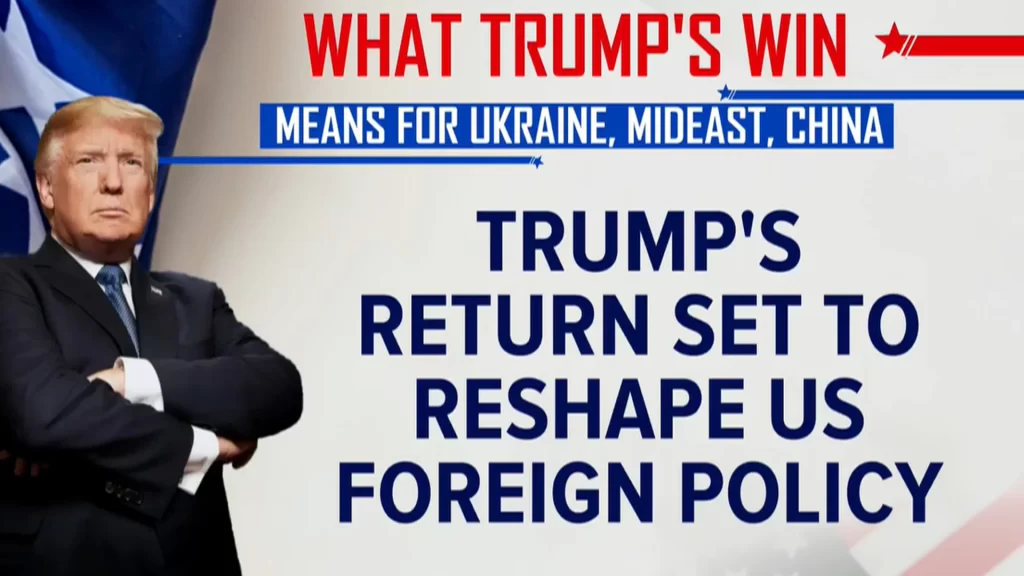
Donald Trump’s return to the White House is set to bring significant shifts in U.S. foreign policy, particularly in relation to Ukraine, the Middle East, and China. His campaign promises, often based on principles of non-interventionism, protectionism, and “America First,” indicate a potential departure from traditional diplomatic practices, especially amid ongoing global crises. Here’s a closer look at how his foreign policy approach might evolve in these key regions.
Russia, Ukraine, and NATO
Trump has repeatedly claimed he could end the Russia-Ukraine war in a day, though he has offered few details on how. During his first term, his foreign policy towards Russia was somewhat erratic, swinging from praise for President Vladimir Putin to imposing sanctions. On Ukraine, Trump has been criticized for his pro-Russia rhetoric and his seeming ambivalence toward supporting Kyiv. A May 2023 policy paper by two of Trump’s former advisers suggested that the U.S. should continue supplying weapons to Ukraine but condition this on peace talks with Russia. This would likely include a delay in Ukraine’s NATO membership, a key demand from Moscow.
Trump’s “America First” policy, which prioritizes U.S. interests, extends to NATO. The former president has long been critical of NATO, accusing European nations of not paying their fair share for defense. While Trump has previously floated the idea of withdrawing from NATO entirely, this would represent a drastic shift in transatlantic relations. Whether Trump follows through on this or uses it as leverage to pressure NATO members into spending more on defense remains unclear. NATO leaders will certainly be concerned about the future of the alliance under Trump, especially as Russia’s influence in Europe grows.
The Middle East
Trump’s approach to the Middle East has been characterized by a mix of aggressive rhetoric and a preference for unilateral action. His campaign promises to bring “peace” to the region, particularly in the ongoing Israel-Hamas and Israel-Hezbollah conflicts, lack specific plans. Trump’s tenure in office saw strong pro-Israel policies, including moving the U.S. embassy to Jerusalem, a move that infuriated Palestinians and much of the Arab world. He also brokered the Abraham Accords, normalizing relations between Israel and several Arab countries, sidelining the Palestinian cause in the process.
During his second term, Trump is likely to return to his “maximum pressure” strategy toward Iran, which includes sanctions and military threats. This could involve increased pressure on Iran, aiming to curb its support for groups like Hamas. However, Trump’s handling of the Gaza war, in which both Israel and Hamas are involved, is uncertain. While he has praised his own handling of Israeli security, it remains to be seen how he will navigate the complex dynamics of the Middle East—especially balancing his relationship with Israel and key Arab countries.
In regard to Palestine, Trump’s policies were widely seen as disregarding their aspirations for a two-state solution, which will likely continue to shape his approach. His unpredictability, often viewed as a diplomatic strength by his supporters, could prove to be a liability in the already volatile Middle East.
China and Trade
China is perhaps the most strategically important foreign policy challenge for the U.S., and Trump’s approach to Beijing during his first term was defined by escalating trade wars and tariffs. Trump labeled China a “strategic competitor” and imposed tariffs on Chinese imports, which led to retaliatory tariffs from Beijing. While the Biden administration maintained many of Trump’s tariffs, it also sought to rebuild alliances in the Asia-Pacific to counter China’s rise.
If Trump returns to office, he is likely to continue his tough stance on trade, using tariffs as a tool to counter Chinese economic influence. However, his relationship with Chinese President Xi Jinping is complex; while he has praised Xi as a “brilliant” leader, he also views China as a direct economic threat to U.S. interests. Trump’s previous attempts to de-escalate the trade dispute with China were undermined by the Covid-19 pandemic, and his framing of the virus as a “Chinese virus” further soured relations.
Trump has also made clear that he sees Taiwan as a critical issue, threatening to impose tariffs on Chinese imports if Beijing attempts to blockade the island. Despite this, he claims that a direct military conflict over Taiwan could be avoided through a strong stance against China, arguing that Xi understands his unpredictability.
Trump’s stance on China will have broad implications for global security and trade. While he may seek to reduce U.S. dependency on Chinese goods, his focus on tariffs and protectionism could strain relations further and risk exacerbating global economic tensions.
Conclusion
In summary, Trump’s foreign policy in a second term would likely mark a return to his “America First” approach, characterized by skepticism of international alliances, a focus on trade protectionism, and a more transactional view of diplomacy. In Ukraine, Trump’s policy could push for peace talks but at the risk of abandoning the U.S.’s commitment to NATO and weakening its support for Kyiv. In the Middle East, his aggressive stance towards Iran and unconditional support for Israel could deepen regional divisions, while his handling of China will remain critical for global security and trade. His foreign policy may be less predictable than his predecessors, posing significant challenges to allies and adversaries alike.







